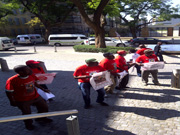Massmart CEO refuses to guarantee union recognition after Walmart deal

The Competition Tribunal is considering whether to allow retail multinational Walmart to buy local retailer Massmart.
The global coalition of unions contesting the merger – South Africa Commercial, Catering and Allied Workers Union (SACCAWU), UNI Global Union, and the United Food and Commercial Workers International Union (UFCW) of North America— will present evidence showing that the Tribunal should only allow the deal to go through if Walmart agrees to conditions on treatment of workers, union rights and sourcing products locally.
On the hearing’s first day, Massmart CEO Grant Pattison repeatedly refused to give to give his commitment from the stand that the company will maintain union recognition where it is currently recognised. Pattison also refused to back up claims that the deal will contribute to job growth, saying the economy may shrink and it is impossible to promise job growth. These caveats came despite earlier having made public pronouncements doing just that.
Pattison did accept that in a post-Walmart South Africa, “a lot is going to change”. However, in response to questioning on this point, he stated that “reducing wages would not be good commercially” and that retailing is “quite a skilled job”. He conceded that Walmart’s global buying power and the company’s Global Sourcing Toolkit were a cost advantage and referred to working with Walmart’s International Integration Division. The purpose of the Global Sourcing Toolkit is – according to the document itself – to ensure that Walmart pays as little as possible for goods by leveraging its size and power. The scope of the Global Sourcing Toolkit is that there is an “emphasis placed on importing new or existing items from outside the country at a lower cost” and Pattison admitted under questioning that there was no reason why this wouldn’t be applied in South Africa.
The questioning also revealed that Pattison was going to benefit greatly from Walmart's entry on a personal level and ended with him admitting that the amount of money he would get if the deal went through was “huge”. The lawyer then put it to him that he is an unreliable witness as he has a vested interest in the merger going through and therefore is going to great pains to answer questions in the best possible light to ensure that happens.
In light of the results of the first day of the hearing, UNI renews its call for the merger to be prohibited or put under strict conditions in order to protect the rights of workers accomplished over long years of hard fights by SACCAWU and to secure local sourcing.

